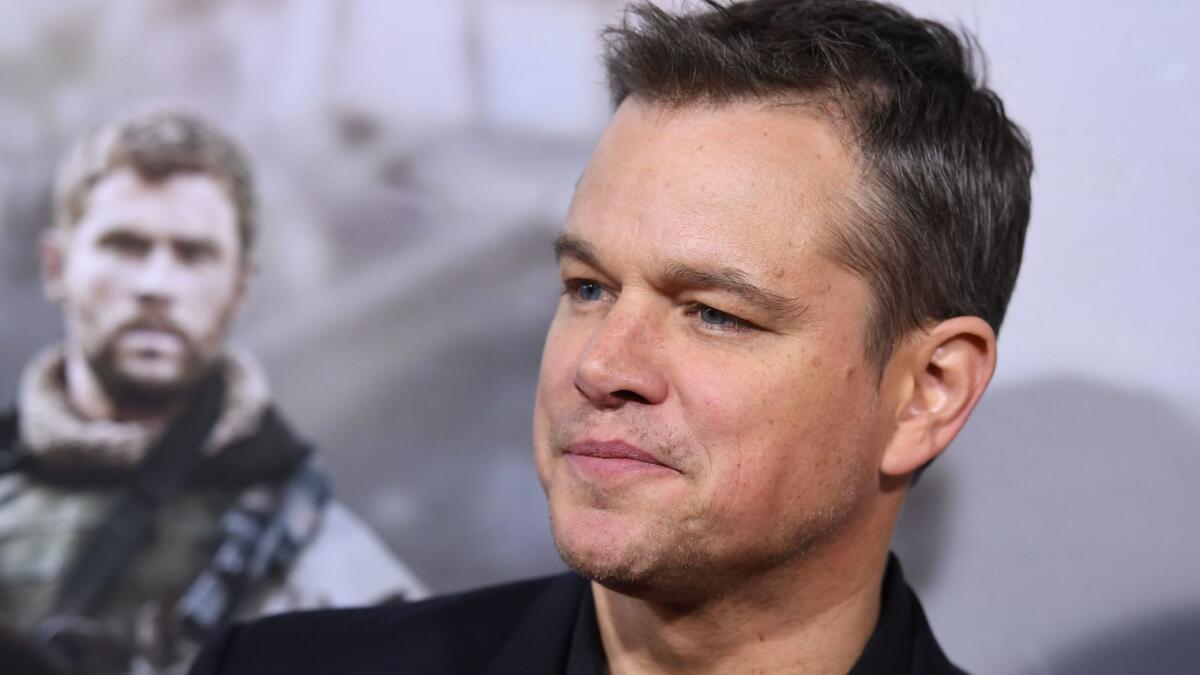Column: Whose voices carry the most weight in our conversation about sexual harassment? (Hint: Not Matt Damon’s)

- Share via
Like you, I have been thinking a lot about sexual harassment, appropriate retribution and all the careers rightfully derailed by the great reckoning that is consuming so much of our public discussion right now.
I have no sympathy for the tattered careers of men such as Harvey Weinstein, Matt Lauer, Charlie Rose or Kevin Spacey. Instead, like many of you, I worry far more about their victims, whose careers and lives were damaged, stunted or derailed in ways we may never know by these powerful miscreants; how they got away with so much for so long; and whether structural and institutional changes (like an end to nondisclosure clauses in legal settlements) will result in a more just world for working women.
There’s no escaping the drumbeat of news about high-ranking men who have been accused of behaving badly. On Thursday, for instance, the Los Angeles Times was rocked by an NPR report detailing two sexual harassment lawsuits, and settlements, against the paper’s new publisher, Ross Levinsohn, who is also alleged to have used a homophobic slur in a business setting.
And yet, despite these nonstop revelations, it seems that we are moving into a strange but probably predictable phase in the debate: Who gets to talk about it? Who gets to define it? And who gets yelled down when they dare to hold forth on it?
::
Last month, I watched the actor Matt Damon make some very reasonable points during a TV talk show about the spectrum of harassment and how we need to distinguish between a pat on the butt and rape or child molestation. I was with him all the way.
Sadly, though, he kept talking.
He implied that the comedian Louis C.K., who admitted to masturbating in front of numerous women — many looking for career advice from a giant in their field — could be forgiven because he had admitted what he’d done and apologized.
“I don’t imagine he’s going to do those things again,” Damon said. “I imagine the price that he’s paid at this point is so beyond anything.”
Damon’s expression of “himpathy” was not well-received. (“Himpathy” was coined by the Cornell philosophy professor Kate Manne to describe what she told Slate is “the disproportionate empathy extended in the direction of men we make too many excuses for.”)
What’s “so beyond anything” is the idea that one man thinks he can absolve another of his transgressions against women. It wasn’t Damon’s place to let C.K. off the hook, and women let him have it.
“We are not outraged because someone grabbed our asses in a picture,” tweeted Alyssa Milano, an instigator of the #MeToo movement. “We are outraged because we were made to feel this was normal…. We were outraged because we were silenced for so long.”
One of Damon’s former co-stars, Minnie Driver, tweeted at him as well: “I honestly think that until we get on the same page, you can’t tell a woman about their abuse. It’s galling when a powerful man steps up and starts dictating the terms, whether he intends it or not.”
Soon, Damon, a hangdog expression on his face, was back on TV, apologizing.
“This whole Time’s Up [movement], a lot of those women are my dear friends, and I love them and respect them and support what they’re doing and want to be a part of that change and go along for that ride,” he told Kathie Lee Gifford this week on “Today.” “I should get in the back seat and close my mouth for a while.”
Indeed.
Men, as so many are discovering right now, need to be talking less and listening more.
::
I’m a lot more interested in the conversation women have been having, even when it gets brutal, as happened this week when cable news host Ashleigh Banfield ripped into a young woman who claimed that the actor Aziz Ansari’s sexual aggression during a date left her in tears and feeling assaulted.
There was plenty interesting about the woman’s story, which appeared on the website Babe.net. She wasn’t able to say no when she wanted to, she expected Ansari to read her nonverbal cues and she engaged in various kinds of sexual activity with him. Should that sort of unhappy — but certainly not atypical — interaction be allowed to damage a man’s career?
Banfield didn’t think so. Looking into the camera, during her HLN show “Crime & Justice,” she unloaded on the anonymous 23-year-old, who Banfield said was trivializing the #MeToo movement by trying to characterize a bad date as a sexual attack.
“You had an unpleasant date,” Banfield said. “And you did not leave. That is on you…. It did not send you to the police; it did not affect your workplace or your ability to get a job. You have chiseled away at a movement that I, along with all my sisters in the workplace, have been dreaming of for decades.”
Whatever feelings you have about the Babe story — I think it only made the case that Ansari was insensitive — Banfield’s was a needlessly harsh takedown of a young woman. The piece sparked a lot of valuable discussion about how we go about teaching women to stand up for themselves.
Unsurprisingly, the reporter who wrote the Babe story, Katie Way, did not take kindly to Banfield’s critique. In response to an invitation to appear on Banfield’s show, the 22-year-old sent a blistering and juvenile reply, calling Banfield a “burgundy lipstick, bad highlights, second-wave feminist has-been.”
Women finally have the country’s ear. We need to elevate the conversation, not debase it.
Twitter: @AbcarianLAT



